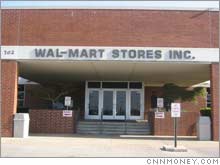Wal-Mart becomes gay-friendlyThe retail giant has been walking a thin line between gay rights groups and Christian conservative groups. But there's no backing out of the issue now, says Fortune's Marc Gunther.NEW YORK (Fortune) -- No big company wants to get caught in the culture wars. But staying on the sidelines isn't easy when it comes to gay rights. Just ask Wal-Mart (Charts). As the world's largest retailer has become more gay-friendly, it has provoked a backlash from Christian conservative groups.
The American Family Association and its founder, the Rev. Donald Wildmon, called for a boycott of Wal-Mart during the Thanksgiving weekend, and then called it off abruptly after the company said it would "not make corporate contributions to support or oppose highly controversial issues unless they directly relate to our ability to serve our customers." Keeping its promises Does that mean Wal-Mart's pulling back its support of gay groups? Probably not. Mona Williams, a company spokeswoman, told me that Wal-Mart intends to be "more thoughtful" and "more selective" when it makes contributions, directing them to "specific projects" rather than to supporting "an organization across the board." But she also said the company would remain "100 percent supportive" of its own, newly-organized group of gay, lesbian, bisexual and transgender (GLBT) employees, called Wal-Mart Pride. Here's some history: Since Wal-Mart Pride was sanctioned in 2005, Wal-Mart has supported several gay causes. Wal-Mart donated $60,000 to Out & Equal, a nonprofit group that brings together gay-employee networks from companies across America, and this fall it sent about 40 Pride members to Out & Equal's annual convention. Wal-Mart also joined the National Gay and Lesbian Chamber of Commerce, an organization of about 24,000 gay and lesbian-owned businesses, and several Wal-Mart execs bought tickets to the annual dinner of the Human Rights Campaign, the nation's largest gay-advocacy group. It turns out that much of this activity can be traced back to an unassuming middle manager who several years ago asked Wal-Mart to live up to the words in the cheer - "It's My Wal-Mart" - that its people shout out whenever groups of them get together. Early in 2003, Ken Pearson, who works at Wal-Mart University, the company's training arm, came back from a corporate meeting where the theme was "It's My Wal-Mart" and speakers included the African-American poet Maya Angelou. "But I didn't really feel like it was my Wal-Mart, as a gay man," Pearson says. Back then, the company did not have a written policy protecting gay, lesbian, bisexual and transgender (GLBT) employees against discrimination. Nor did it provide health benefits to the same-sex partners of gays and lesbians. So Pearson composed an e-mail to a Wal-Mart vice chairman, explaining that he is gay, asking if he was welcome at Wal-Mart and outlining his concerns. "I sat there shaking," Pearson recalls. "Can I hit send? There's nothing to protect me from losing my job." Soon after dispatching the e-mail, Pearson was invited to meet with the executive, who told him that the letter had moved him and that things would change. They did, and fast. In May 2003, Wal-Mart added protection for sexual orientation to its non-discrimination policy. As it happened, a shareholders meeting organized by the Pride Foundation, a Seattle-based nonprofit that supports gay causes, also had been asking the company to do so. Belying its Bible belt roots, Wal-Mart has since opened discussions with such gay rights leaders as Joe Solmonese and Daryl Herrshaft of the Human Rights Campaign and Selisse Berry, executive director of Out & Equal. The company hired Witeck-Combs, a Washington, D.C.-based consulting firm that specializes in marketing to gay consumers. After visits to Bentonville, most came away impressed with Wal-Mart's sincerity. Selisse Berry of Out & Equal says: "The GLBT group is very committed and passionate, and they seem to be gathering more and more executive support." This year, Wal-Mart donated three scholarships to the Point Foundation, which supports students who are marginalized - often, cast off by their families - because of their sexual orientation or gender identity. It also sponsored a panel at the National Lesbian and Gay Journalists Association convention. More work ahead Pearson, who is 34, says the Pride group has made headway at Wal-Mart by focusing on the business case for equality. They have argued that Wal-Mart, by changing, will be able to attract and engage gay employees and reach more gay consumers, especially as it expands into urban markets. This year, some Wal-Marts sold gay-themed jewelry. "I didn't expect this much movement this quickly," he says. There's more work ahead. Wal-Mart still does not offer health care benefits to the domestic partners of its GLBT employees. More than half of Fortune 500 companies do so. In the Corporate Equality Index published by the Human Rights Campaign, Wal-Mart scores a 65 - up from 14 in 2002, but well shy of the 100 percent score notched by more than 100 big companies. What's more, Wal-Mart Pride draws nearly all of its members from the home office. Pearson and his allies want to expand into the field, where most of the company's 1.3 million employees work. As more of Wal-Mart's GLBT employees come out of the closet, their clout inside the company will grow. "I worked for our company for 16 years," says David Yates, a leader of Wal-Mart Pride. "The word gay had almost never been mentioned. Or it was whispered." Now it's being said often, and out loud. Which means it's probably too late for Wal-Mart to reverse its gay-friendly course. To subscribe to Marc Gunther's CNNMoney columns on the social and environmental impact of business, visit www.marcgunther.com. ______________________ |
|

